Opinion
UrbanShift Looks Back: On the Importance of Facilitating Multi-Level Collaboration
Over the course of the UrbanShift program, ICLEI has led on National-Local Dialogues and other efforts to support enhanced collaboration across levels of government to create more aligned, actionable climate strategies.
The UrbanShift project will conclude in October 2025. In the program’s final year, we will be looking back at our work to support integrated and sustainable urban planning through a series of conversations with the partner organizations who have led UrbanShift. This is the fourth piece in this series. Read the first on our capacity-building work here, the second on finance support here and the third on cross-sectoral climate action here.
Eillie Anzilotti: Thinking back to the beginning of the UrbanShift project, what was the initial vision for ICLEI’s contribution?
Maryke van Staden: UrbanShift set out to close the gap between national and local action on sustainable urban development. When we were co-designing the project, we wanted to build on the strengths of ICLEI—our broad network and our ability to deliver technical, capacity-building support in a diverse array of contexts. We noticed, from a climate action perspective, that there is often a disconnect between national and local governments, with no formal coordination or communication process around sustainable urban development. The National-Local Dialogues were developed as a space where leaders from national and subnational governments could have frank, constructive, closed-door conversations. This would make sure they could align, from the beginning of the project, around what the local governments wanted to accomplish and where there were opportunities for national governments to enhance support around policy and implementation.
Local implementation was really the bottom-line goal — to ensure that UrbanShift had a measurable impact on the ground and that national governments were involved and supportive. All ICLEI’s deliverables have been in support of accelerated implementation. We linked our Transformative Actions Program (TAP), which is now in its 10th year, to UrbanShift to enhance local infrastructure projects to attract investment. Access to finance is a critical issue for all local governments and through TAP, they can get support and review from technical experts to strengthen project proposals to make them more robust and appealing, also to multilateral development banks. We have gathered several projects from cities active in UrbanShift. Linked to this idea of implementation and tracking progress is the development of the Integrated Sustainable Development Assessments (ISUDAs), which provide a baseline and an endline snapshot of each city’s policies and projects, so progress is visible and measurable. Alongside the National-Local Dialogues and direct project support, these ISUDAs help cities and countries see where they can strengthen their policies and implementation pipelines, also to raise the ambition of their climate targets.
Eillie Anzilotti: Why has it proven so essential for national and local governments to connect through these Dialogues through the UrbanShift project?
Maryke van Staden: Our funder, the Global Environment Facility, primarily serves national governments. Through the UrbanShift program, the national governments identified the local governments for the national child projects, which then received support from the UrbanShift global platform. So there was an automatic need for these levels of government to engage with each other throughout the project. We designed the National-Local Dialogues to ensure a dedicated conversation was held at least twice over the project lifetime, in most countries. There’s been a real interest in this offer. Often, where there is a top-down government approach, the national governments instruct local governments on the way forward. We wanted to rather ensure a “top-down meets bottom-up conversation." Our starting point is always to ask the local governments what topics they want to put on the table for discussion with their national government. These topics have served as generative starting points for discussions. In Indonesia, for instance, waste was a core topic of interest for the cities. There is a local mandate to manage waste, but comprehensive integrated and aligned enabling frameworks could be improved. Approaching this topic collectively allowed the national and city representatives to co-define a multi-level plan of action and ensure continued alignment and shared goals—essentially, a Roadmap for action. These Roadmaps were worked on between the first and second Dialogues to support a whole-of-government approach, which we recommend to all countries. These closed-door, facilitated, targeted conversations really encourage stakeholders to go into listening mode, learn from each other, and co-define collaboration.
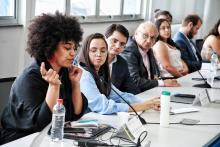
Eillie Anzilotti: What barriers to countries and cities typically face in aligning on shared goals and priorities, and how has ICLEI’s work with them through UrbanShift helped break down some of these barriers?
Alyssa Chenault: A cross-cutting barrier is unclear and unaligned mandates across levels of government. In Brazil, for instance, there are 81 distinct metropolitan regions within the country, yet shared regional plans is still developing. The Dialogues have created space to surface that need and advance more integrated approaches while recognizing Brazil as a key partner and leader in this work.
And on a fundamental level, political turnover has posed another challenge. UrbanShift is a five-year project, and that’s a wonderful amount of time to make progress. But in the background, we have to contend with the reality of elections and shifting priorities. Even technical staff within governments can come and go, and that affects continuity and the ability to adhere to previous agreements and follow through on them.
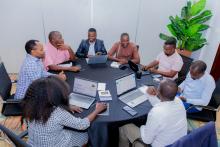
Eillie Anzilotti: Despite these challenges, how have the National-Local Dialogues helped the countries within the UrbanShift network identify specific challenges and work toward shared goals?
Alyssa Chenault: The example of waste management in Indonesia is a really powerful one. But also in Morocco, through the first National-Local Dialogue, stakeholders actually developed a compact around circular development in the country. In essence, they transformed our concept of a Roadmap and used it as a framework to secure cross-sectorial and cross-governmental buy-in around advancing circular systems in the country. Rwanda has been very focused this year on updating its Nationally Determined Contributions (NDCs), so we were able to structure our second dialogue in the country around this effort. We found that this was a great approach to a National-Local Dialogue as it responded to local needs and can be replicated in subsequent years to follow up on NDC implementation. The city of Pune in India has indicated that the National-Local Dialogues in India furthered implementation of their transit-oriented development project. In China, the city of Ningbo told us that their Hangzhou Bay wetland conservation project wouldn't have happened at the speed that it did without the dialog. And Balikpapan, Indonesia was able to accelerate their sustainable urban mobility plan because of the increased alignment through the Dialogues.
Maryke van Staden: With several countries that have gone through elections over the course of the project, we’ve been able to use the Dialogues to align on shifted priorities. In Argentina, for instance, there’s been a major shift toward discussing private sector investment in energy following their election in 2023. With this knowledge, we can structure the dialogue to align around this new interest while ensuring that we also focus on the role of local governments in the conversation.
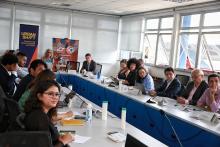
Eillie Anzilotti: What is one key challenge that you’ve encountered and had to navigate over the course of the UrbanShift program, and what’s been a standout highlight for you?
Maryke van Staden: Each of the UrbanShift partners has led our activities in a particular region. ICLEI was the lead in Asia. For us, this was quite exciting—we’ve already been active in China, Indonesia and India, and there are enormous opportunities to advance sustainable development in all three countries. All three countries have a rather top-down styles of governance. The Dialogues offered a new way to collaborate, helping national officials hear directly from cities. Designing City Academies, Labs, and Peer to Peer Exchanges across languages was complex, but the cross-cultural exchange unlocked rich peer learning. The challenge ended up being a positive one.
Alyssa Chenault: Throughout the project, we aimed to design everything around actual government needs, which were evolving over the 5-year project. The baseline ISUDAs helped us target support, and the Dialogues gave us a regular touchpoint to validate priorities and adjust our capacity building.
The highlight has been the energy in the room at all the activities. People have been so eager to contribute and share their experience in the hopes of helping another person and another project. We’ve loved seeing familiar faces attend more than one event: Somebody might have joined for the Asia Forum, then a City Academy, and then a Peer-to-Peer Exchange on a similar topic. We could see that there was genuine enthusiasm to participate and build on and share knowledge. Plus, the benefit of working with ICLEI is that even after the UrbanShift program ends, we will be able to take what we’ve learned and ensure the knowledge and insights continue to spread to other cities.
Maryke van Staden is the director of ICLEI's carbonn Climate Center.
Alyssa Chenault is the Global Manager for UrbanShift at ICLEI.
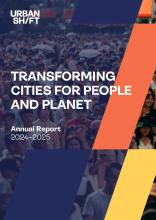
UrbanShift Annual Report 2024-2025
UrbanShift's final Annual Report spans an impactful year of over 30 events and major progress across our network of 23 cities.
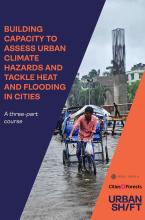
Building Capacity to Assess Urban Climate Hazards and Tackle Heat and Flooding in Cities
These three interconnected courses are designed to build the capacity of city officials and urban practitioners to conduct vulnerability assessments.
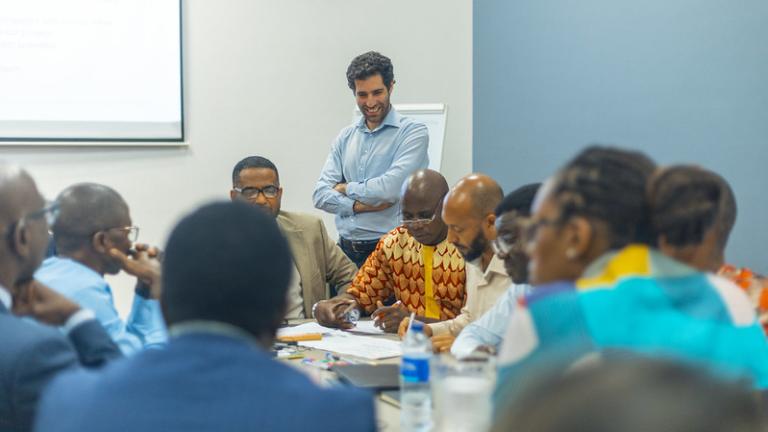
UrbanShift Looks Back: Reflecting on Uniting Stakeholders for Climate Action
C40’s Viola Follini, Matheus Ortega, Emily White, Anelise Rosa, and Amaia Leonet discuss the value of bringing a wide range of sectors—from mayors to the private sector—to the table to accelerate urban transformation.
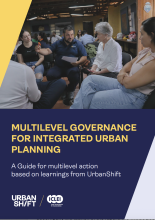
MULTILEVEL GOVERNANCE FOR INTEGRATED URBAN PLANNING
This report outlines key learnings and insights from UrbanShift's Multi-Level Governance Dialogues.

